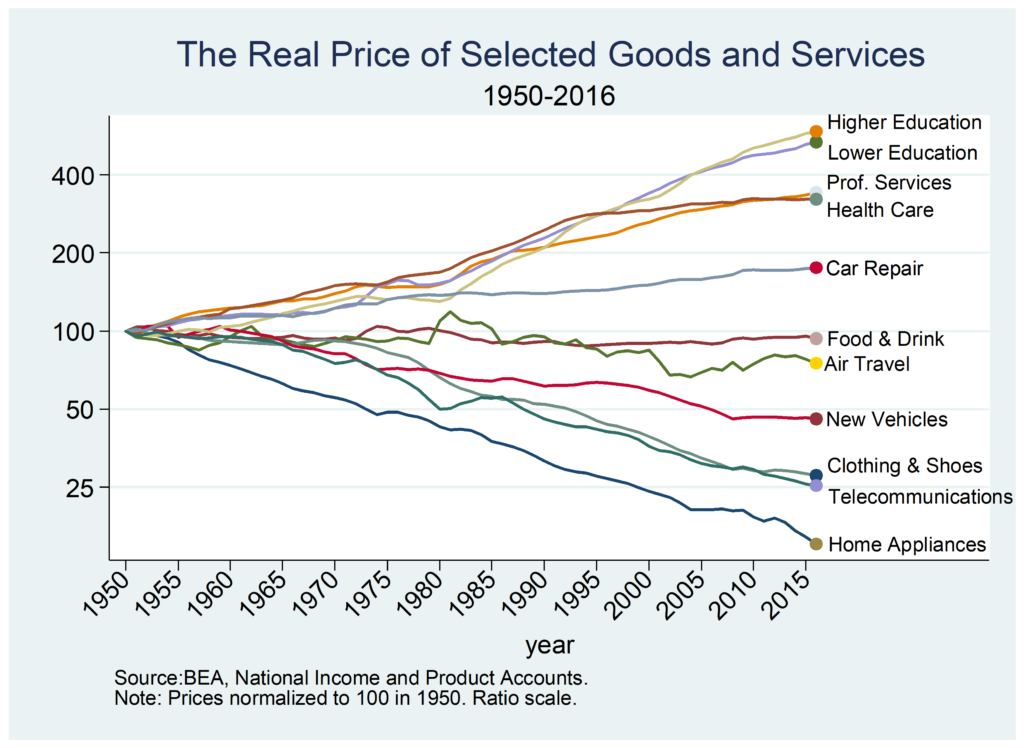Capitalism's Productive Capacity is an Argument for Socialism
when our species gets this productive, how can we justify anyone being poor?
The chart above is a bit hard to parse at first glance, but its basic point is clear - in 40 years, these commodities have all gotten vastly cheaper as expressed in the amount of time one would have to work to afford them. Food production is a particularly important element of productivity increases, for obvious reasons. Here’s wheat production in the poorest countries over time, to pick one.

What’s interesting to me is that these remarkable improvements in productivity - this immense growth in material abundance - is typically used as evidence for capitalism and against socialism. Look at how great capitalism is! Why would we ever want to change to a different system? And yet to me, the lesson is the opposite: look at how advanced humanity is! Why would we let anyone go hungry or cold when we have this kind of productive capacity? The more that humanity advances, the more the implicit argument for socialism grows stronger. And I have zero problem with ascribing that growth to capitalism, as long as people get on board with a more humane stage to come.
Forgive me for repeating the point, but Karl Marx and Friedrich Engels were not anti-capitalists but post-capitalists, and Marxist economics hold that capitalism is an absolutely necessary stage of human development before socialism can flourish. 19th-century British capitalism caused the human misery that so offended Marx, yes, but it also created the awesome productive power that inspired him to think a society of universal abundance was possible. This, before any other reason, is why communism really never has been attempted - because none of the countries that attempted communism did so following a sufficient period of capitalist productive activity. How could the Russia of 1917 - a dirt-poor, undeveloped country already suffering from famine that had experienced decades of terrible mismanagement by an incompetent monarchy - have fulfilled the promise of a social system that provides for all of us? At some point we have to ask what possible relevance the experiences of the Russians and the Chinese 100ish and 75ish years ago can have to America today, when it comes to providing for our people.
And we have examples of countries that are far more generous in redistributing wealth and which own far more of their local economies than the United States. No, the Nordic states are not socialist systems, but they are countries with far more socialized economies who nevertheless have not turned off the productivity spigot. Indeed, Norway, Denmark, Iceland, and Finland are all among the 15 most productive countries on earth. There is no credible reason to believe that reducing the fear of poverty in those states has reduced the desire to work, develop, and flourish in those countries, given that they are sites of scientific advance, academic excellence, and good government. (And for the record the richest guy in Denmark, which enjoys the most equal society in the OECD and perhaps the lowest poverty in the world, is still worth like $11 billion. You know anybody who would say, “you know, I would work hard, but $11 billion just isn’t enough to hustle for”?)
The trouble here is with Baumol’s cost disease, the tendency of certain kinds of labor-intensive, service-oriented sectors to keep getting more expensive even while physical goods get reliably cheaper. It’s a major problem and not one with an obvious solution. Let’s be clear that this isn’t in any sense a problem only of countries with more progressive economies. Education, healthcare, administration, housing - these things have not only not kept pace with improvements to productivity in food and (especially) consumer goods, they’ve gotten vastly more expensive across the capitalist world. Socialism would not necessarily fix these problems. But a socialized system with a strong central government would be able to implement common-sense reforms to help keep costs down, such as a single-payer health system that eliminates a great deal of insurance company rent-seeking and sets prices, regulations on expensive amenities and the number of administrators at colleges, and pro-density policies that allow more building of housing, particularly in our urban cores.
Of course, the fact that no countries have followed advanced capitalism with communism might suggest that capitalism is good enough that people don’t want to switch. And in my darker moments I often think that the short-term dopamine-delivering pleasures of capitalism, the video games and Tik Toks and internet porn and big screen TVs and beer, are too powerful, that they serve to stop people from being roused to confront the innumerable inequities and injustices in our system. But I will say this: I’ve never met anyone who doesn’t agree with the system of universal abundance in Star Trek, given the conditions in Star Trek. This isn’t a joke: I mean that, if you present people with a society where technological progress is so advanced that abundance for everyone is possible, even the most ardent capitalist will concede that it would be immoral to perpetuate a system that did not allow for the distribution of abundance to everyone. But then, Star Trek is Star Trek. The compelling questions are, what level of abundance is sufficient to prompt this moral imperative, and how do we know when we’vee gotten there?





Really too bad that apparently all the Marxists who seized the means of production were anti-capitalists instead of post-capitalists.
"Of course, the fact that no countries have followed advanced capitalism with communism might suggest that capitalism is good enough that people don’t want to switch."
Unironically, yes.
Another thing to grapple with is that the "global poor" are far, far poorer than the poor in any advanced industrial country (what's more nationalistic than a social program helping the poor in one country?). So unless you want to jump straight to global communism, somehow, implementing full on socialism in any rich country very well might hurt economic growth in impoverished countries.
Capitalism + safety net can be done without wrecking market mechanisms, misaligning incentives, or killing the Golden Goose of technological progress, increased productivity, and economic growth. Web3, er, I mean neoliberalism solves this. Be growth-focused, not redistribution-focused, and you tend to get the (realistically) best of both.
If you haven't read it, Tyler Cowen's Stubborn Attachments is probably the best explanation of this I'm aware of.